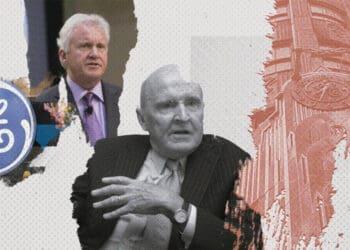When U.S. enforcement officials review fact patterns related to FCPA violations, they do so with the benefit of 20/20 hindsight. At the time that the violation occurs, however, in the context of a fast-paced business environment, certain red flags might not stand out. Transactions in the moment might not seem as questionable as they do after the fact. Compliance missteps might appear minor and excusable at the time, only to become more meaningful when the larger picture is considered.
The SEC’s August FCPA enforcement actions against Key Energy Services could be a case in point. That action resulted in the payment of $5 million in disgorgement by the company. In that case, the SEC explained that the company’s Mexican subsidiary “made improper payments to a contract employee at Petróleos Mexicanos (Pemex), the Mexican state-owned oil company, to induce him to provide Pemex inside information as well as advice and assistance on contracts with Pemex and amplifications or amendments to those contracts.” Looking back, it is clear that the U.S. parent company missed several red flags related to its subsidiary’s scheme. The list of “indicia of risk” might be instructive to other U.S. companies doing business in Mexico:
1. Payments to a “consulting” firm despite no record of services.
Key Energy’s Mexican subsidiary hired a local firm to purportedly offer legitimate consulting services, described as “expert advice” on contracts with Pemex. This is the typical type of engagement that would be considered high risk for corruption. The problem was that there was no record that the firm actually provided legitimate services. Nor did the subsidiary maintain any supporting documentation for the work that the consultant was purportedly performing. Nonetheless, the Mexico Country Manager approved payments to the consultant over three years, amounting to $229,000.
2. The consulting engagement did not follow the parent company’s written policies.
The engagement was not pre-approved by Key Energy’s legal department. No due diligence was conducted on the third party. No written contract was put in place. Despite this, there was evidence that the parent company’s legal department learned about the consultant during the course of the engagement and failed to take corrective action. The parent allowed the relationship to continue.
3. The description of the consulting firm’s service (“expert advice”) was consolidated into the parent’s own books and records.
Key Mexico’s accounting system described the engagement as: “Expert advice on contracts with the new regulations of Pemex/Preparation of technical and economic proposals/Contract Execution.” The parent proceeded to consolidate Key Mexico’s books and records into its own, while this suspect description triggered no questions about the appropriateness of the engagement.
4. Access was gained to internal Pemex communications.
Employees at the parent company, including a senior vice president, received an email from the Mexican Country Manager that included the forward of a chain of internal emails from Pemex. The communication was sent from the Pemex employee’s work account. There was even an attachment of an internal Pemex memo that included information and internal deliberations about new contracts that Pemex intended to put out for tender. The Pemex employee who forwarded the information to the Mexico Country Manager wrote, “I am sending you this for your information and so we are ready.” At that time, the new contracts discussed in the memo had not yet been publicly announced. Despite this, no one at the parent company questioned how the subsidiary gained access to the information. In fact, the senior vice president actually responded that the subsidiary should try to get Pemex to add $90 million to Key Energy’s current contract.
5. The parent approved the subsidiary’s gift-giving to Pemex without proper controls or compliance assurances.
The subsidiary gained approval for the contribution of gifts totaling approximately $118,000 to Pemex’s annual 2012 Christmas season celebration with the understanding that the gifts were to be used for a raffle. But in making the approval, the parent did not apply proper compliance safeguards. As a result, the subsidiary wound up directing the gifts to 130 specific Pemex employees in the regions where Key Energy operates. Moreover, the parent company did not respond appropriately to the fact that the amount spent on approved gifts was more than nine times what had been spent on purported raffle gifts in 2010 and approximately 26 times what had been spent in 2011. The U.S. parent also detected nothing problematic about the explanation by Key Mexico’s Country Manager that the higher gift amount in 2012 was correlated to Key Mexico having done more business with Pemex that year, not recognizing the potentially inappropriate connection between giving more gifts and getting more business. It also failed to identify that the gifts were being given during a period of ongoing negotiations with Pemex, something that could have been tagged through proper compliance oversight.
6. No compliance personnel were in place in Mexico.
The U.S. parent did not take steps to put in place personnel with compliance responsibilities at the Mexican subsidiary, to ensure that the parent company’s anti-corruption compliance program was appropriately implemented there.
The opinions expressed in this post are those of the author in his or her individual capacity and do not necessarily represent the views of anyone else, including the entities with which the author is affiliated, the author`s employers, other contributors, FCPAméricas or its advertisers. The information in the FCPAméricas blog is intended for public discussion and educational purposes only. It is not intended to provide legal advice to its readers and does not create an attorney-client relationship. It does not seek to describe or convey the quality of legal services. FCPAméricas encourages readers to seek qualified legal counsel regarding anti-corruption laws or any other legal issue. FCPAméricas gives permission to link, post, distribute or reference this article for any lawful purpose, provided attribution is made to the author and to FCPAméricas LLC.



 Matteson Ellis serves as Special Counsel to the FCPA and International Anti-Corruption practice group of Miller & Chevalier in Washington, DC. He is also founder and principal of Matteson Ellis Law PLLC, a law firm focusing on FCPA compliance and enforcement. He has extensive experience in a broad range of international anti-corruption areas. Previously, he worked with the anti-corruption and anti-fraud investigations and sanctions proceedings unit at The World Bank.
Mr. Ellis has helped build compliance programs associated with some of the largest FCPA settlements to date; performed internal investigations in more than 20 countries throughout the Americas, Asia, Europe and Africa considered “high corruption risk” by international monitoring organizations; investigated fraud and corruption and supported administrative sanctions and debarment proceedings for The World Bank and The Inter-American Development Bank; and is fluent in Spanish and Portuguese.
Mr. Ellis focuses particularly on the Americas, having spent several years in the region working for a Fortune 50 multinational corporation and a government ethics watchdog group. He regularly speaks on corruption matters throughout the region and is editor of the FCPAméricas Blog.
He has worked with every facet of FCPA enforcement and compliance, including legal analysis, internal investigations, third party due diligence, transactional due diligence, anti-corruption policy drafting, compliance training, compliance audits, corruption risk assessments, voluntary disclosures to the U.S. government and resolutions with the U.S. government. He has conducted anti-corruption enforcement and compliance work in the following sectors: agriculture, construction, defense, energy/oil and gas, engineering, financial services, medical devices, mining, pharmaceuticals, gaming, roads/infrastructure and technology.
Mr. Ellis received his law degree, cum laude, from Georgetown University Law Center, his masters in foreign affairs from Georgetown’s School of Foreign Service, and his B.A. from Dartmouth College. He co-founded and serves as chairman of the board of
Matteson Ellis serves as Special Counsel to the FCPA and International Anti-Corruption practice group of Miller & Chevalier in Washington, DC. He is also founder and principal of Matteson Ellis Law PLLC, a law firm focusing on FCPA compliance and enforcement. He has extensive experience in a broad range of international anti-corruption areas. Previously, he worked with the anti-corruption and anti-fraud investigations and sanctions proceedings unit at The World Bank.
Mr. Ellis has helped build compliance programs associated with some of the largest FCPA settlements to date; performed internal investigations in more than 20 countries throughout the Americas, Asia, Europe and Africa considered “high corruption risk” by international monitoring organizations; investigated fraud and corruption and supported administrative sanctions and debarment proceedings for The World Bank and The Inter-American Development Bank; and is fluent in Spanish and Portuguese.
Mr. Ellis focuses particularly on the Americas, having spent several years in the region working for a Fortune 50 multinational corporation and a government ethics watchdog group. He regularly speaks on corruption matters throughout the region and is editor of the FCPAméricas Blog.
He has worked with every facet of FCPA enforcement and compliance, including legal analysis, internal investigations, third party due diligence, transactional due diligence, anti-corruption policy drafting, compliance training, compliance audits, corruption risk assessments, voluntary disclosures to the U.S. government and resolutions with the U.S. government. He has conducted anti-corruption enforcement and compliance work in the following sectors: agriculture, construction, defense, energy/oil and gas, engineering, financial services, medical devices, mining, pharmaceuticals, gaming, roads/infrastructure and technology.
Mr. Ellis received his law degree, cum laude, from Georgetown University Law Center, his masters in foreign affairs from Georgetown’s School of Foreign Service, and his B.A. from Dartmouth College. He co-founded and serves as chairman of the board of 







